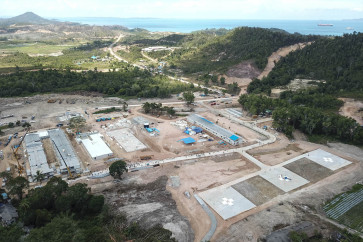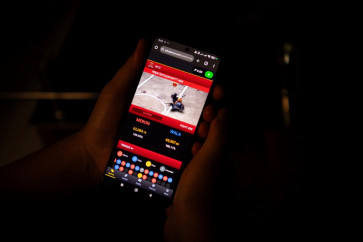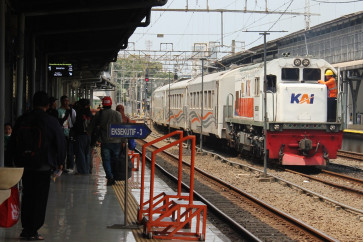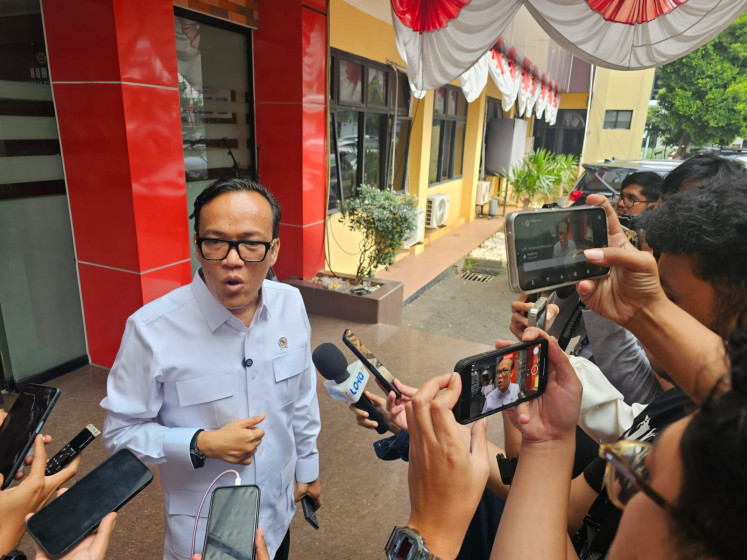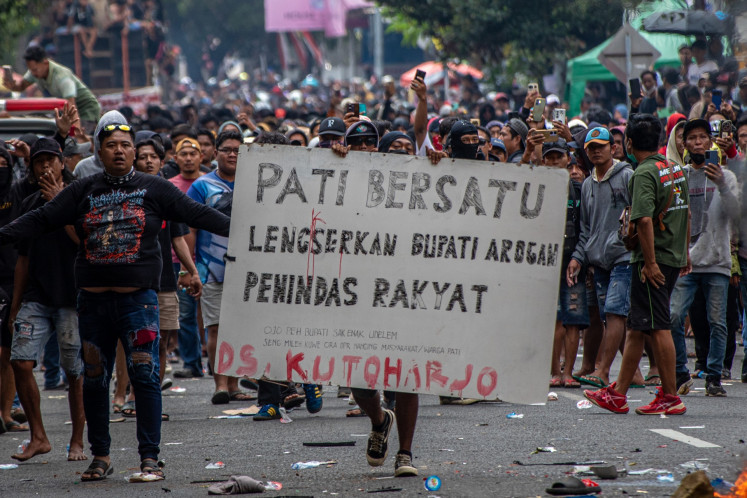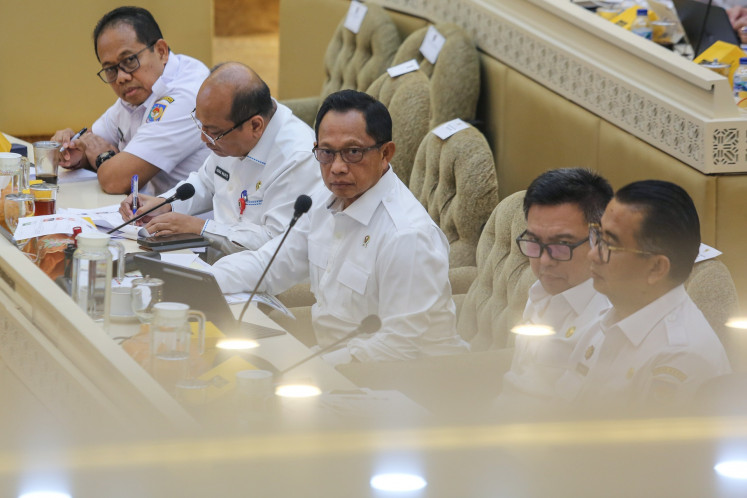Popular Reads
Top Results
Can't find what you're looking for?
View all search resultsPopular Reads
Top Results
Can't find what you're looking for?
View all search resultsReinventing Posyandu
Berat badanku ditimbang selaluPosyandu menunggu setiap waktuâ¦(My weight is always monitoredPosyandu is always waiting
Change text size
Gift Premium Articles
to Anyone
 Clean and bright: A Posyandu TAT clinic in Magelang, Central Java. Nestle and PKK trained 15,000 volunteer healthcare assistants for Posyandu TAT in 2012, and hope to recruit more volunteers for the program. (Courtesy of Nestle Indonesia)" border="0" height="341" width="512">Clean and bright: A Posyandu TAT clinic in Magelang, Central Java. Nestle and PKK trained 15,000 volunteer healthcare assistants for Posyandu TAT in 2012, and hope to recruit more volunteers for the program. (Courtesy of Nestle Indonesia)
Clean and bright: A Posyandu TAT clinic in Magelang, Central Java. Nestle and PKK trained 15,000 volunteer healthcare assistants for Posyandu TAT in 2012, and hope to recruit more volunteers for the program. (Courtesy of Nestle Indonesia)" border="0" height="341" width="512">Clean and bright: A Posyandu TAT clinic in Magelang, Central Java. Nestle and PKK trained 15,000 volunteer healthcare assistants for Posyandu TAT in 2012, and hope to recruit more volunteers for the program. (Courtesy of Nestle Indonesia)A health service volunteer âcomplainedâ that there was still a difference in perception about breast feeding (ASI) among medical staff like doctors or midwives.
âAfter being breast fed, the baby could not pee, so the parent took the baby to a pediatrician, who then suggested the parent should give plain water. Can we say the baby still got exclusive ASI?â, the woman asked during volunteer training at an integrated health service post, Tumbuh Tanggap Aktif (Posyandu TAT) in Mataram, West Nusa Tenggara (NTB) recently.
âNo, it is not exclusive ASI anymore because ASI means we give only ASI to babies. We need to reconcile perception on exclusive ASI between medical staff,â Syahrial, one of the facilitators in the training, said.
The volunteer training for Posyandu TAT is held in cooperation between milk producer PT Nestle Indonesia and the family welfare movement (PKK).
The training in Mataram is the first of a training series as the 2013 program aims to reach six provinces; Aceh, Jakarta, East Nusa Tenggara (NTT), NTB, Riau and West Sulawesi.
A similar training program was followed by 14 provinces in 2012, creating 15,000 health service assistants of Posyandu TAT.
By joining Posyandu TAT training, the volunteers are intended to give additional health services for babies, not only measuring the weight and height of the baby but also developing cognitive growth.
The health assistants will have skills for counseling and training for improving the health of babies and mothers in order to meet Millennium Development Goals (MDGs). Important lesson: A volunteer writes on a board during training for a Posyandu TAT in Mataram, West Nusa Tenggara. The volunteers are expected to provide additional health services for babies, not only measuring the weight and height of the babies but also cognitive growth. (JP)
Important lesson: A volunteer writes on a board during training for a Posyandu TAT in Mataram, West Nusa Tenggara. The volunteers are expected to provide additional health services for babies, not only measuring the weight and height of the babies but also cognitive growth. (JP)
Actually, Posyandu is not a new program in Indonesia. As a community-based healthcare center, Posyandu addresses basic maternal and child health problems such as family planning, antenatal care, immunization, simple diarrhea intervention and nutritional problems, which are identified and tackled at the community unit level
During 1984-1998, the Posyandu program flourished under the leadership of president Soeharto. At the time, many experts praised Posyandu as one of the best practices of community-based healthcare activities in the developing world.
The government conducted a massive campaign, including through the song âAku Anak Sehatâ (I am a Healthy Child) which promoted Posyandu.
WHO data shows that the number of children suffering from protein and energy deficiencies went down around 20 percent during the 1986-1995 period.
Unfortunately, since the fall of Soeharto in 1998, the program has suffered a setback and lack of support. Mothers tend to take their infants to the hospital or a midwife for immunization as they think Posyandu is a place to measure the weight and height of the babies only. (Source: NTB government)
(Source: NTB government)
Ningrum, a Posyandu volunteer from Mataram, said that it was very difficult to encourage mothers to take their babies and children under three years (batita) to Posyandu.
âWe face difficulties with the lack of awareness among people here,â Ningrum said.
Ningrum and other volunteers then tried to integrate the Posyandu with the early childhood education center (Paud) nearby to get more children for regular health checks.
âThis strategy is quite effective because Paud is visited by many children under three years old, mothers, and babies of course,â Ningrum said with a smile.
However, improving childrenâs health is still a challenge in NTB. H Ismail, the head of NTB health agency said that 10 regencies are vulnerable in terms of children and pregnant mothersâ health.
Malnutrition, for instance, remains a serious problem for NTB. During the past year, 13 out of 93 malnourished children under five, who were receiving medical treatment at NTB General Hospital (RSUP), died.
In 2011, the hospital treated 72 infants with malnutrition, 12 of whom died.
In many cases, fatality was caused by the parentsâ reluctance to take their children to community health centers (Puskesmas) or the hospital. Children were admitted to RSUP NTB only when their illness was
already at an advanced stage.
Most malnourished patients often suffer from complications such as pneumonitis, pleuritis, tuberculosis, digestive tract infections and birth defects. Clean and bright: <)
Clean and bright: <)
B
erat badanku ditimbang selalu
Posyandu menunggu setiap waktu'¦
(My weight is always monitoredPosyandu is always waiting..)
--Part of lyric 'Aku Anak Sehat' (I'm a healthy kid)
Clean and bright: A Posyandu TAT clinic in Magelang, Central Java. Nestle and PKK trained 15,000 volunteer healthcare assistants for Posyandu TAT in 2012, and hope to recruit more volunteers for the program. (Courtesy of Nestle Indonesia)
A health service volunteer 'complained' that there was still a difference in perception about breast feeding (ASI) among medical staff like doctors or midwives.
'After being breast fed, the baby could not pee, so the parent took the baby to a pediatrician, who then suggested the parent should give plain water. Can we say the baby still got exclusive ASI?', the woman asked during volunteer training at an integrated health service post, Tumbuh Tanggap Aktif (Posyandu TAT) in Mataram, West Nusa Tenggara (NTB) recently.
'No, it is not exclusive ASI anymore because ASI means we give only ASI to babies. We need to reconcile perception on exclusive ASI between medical staff,' Syahrial, one of the facilitators in the training, said.
The volunteer training for Posyandu TAT is held in cooperation between milk producer PT Nestle Indonesia and the family welfare movement (PKK).
The training in Mataram is the first of a training series as the 2013 program aims to reach six provinces; Aceh, Jakarta, East Nusa Tenggara (NTT), NTB, Riau and West Sulawesi.
A similar training program was followed by 14 provinces in 2012, creating 15,000 health service assistants of Posyandu TAT.
By joining Posyandu TAT training, the volunteers are intended to give additional health services for babies, not only measuring the weight and height of the baby but also developing cognitive growth.
The health assistants will have skills for counseling and training for improving the health of babies and mothers in order to meet Millennium Development Goals (MDGs).
Important lesson: A volunteer writes on a board during training for a Posyandu TAT in Mataram, West Nusa Tenggara. The volunteers are expected to provide additional health services for babies, not only measuring the weight and height of the babies but also cognitive growth. (JP)
Actually, Posyandu is not a new program in Indonesia. As a community-based healthcare center, Posyandu addresses basic maternal and child health problems such as family planning, antenatal care, immunization, simple diarrhea intervention and nutritional problems, which are identified and tackled at the community unit level
During 1984-1998, the Posyandu program flourished under the leadership of president Soeharto. At the time, many experts praised Posyandu as one of the best practices of community-based healthcare activities in the developing world.
The government conducted a massive campaign, including through the song 'Aku Anak Sehat' (I am a Healthy Child) which promoted Posyandu.
WHO data shows that the number of children suffering from protein and energy deficiencies went down around 20 percent during the 1986-1995 period.
Unfortunately, since the fall of Soeharto in 1998, the program has suffered a setback and lack of support. Mothers tend to take their infants to the hospital or a midwife for immunization as they think Posyandu is a place to measure the weight and height of the babies only.
(Source: NTB government)
Ningrum, a Posyandu volunteer from Mataram, said that it was very difficult to encourage mothers to take their babies and children under three years (batita) to Posyandu.
'We face difficulties with the lack of awareness among people here,' Ningrum said.
Ningrum and other volunteers then tried to integrate the Posyandu with the early childhood education center (Paud) nearby to get more children for regular health checks.
'This strategy is quite effective because Paud is visited by many children under three years old, mothers, and babies of course,' Ningrum said with a smile.
However, improving children's health is still a challenge in NTB. H Ismail, the head of NTB health agency said that 10 regencies are vulnerable in terms of children and pregnant mothers' health.
Malnutrition, for instance, remains a serious problem for NTB. During the past year, 13 out of 93 malnourished children under five, who were receiving medical treatment at NTB General Hospital (RSUP), died.
In 2011, the hospital treated 72 infants with malnutrition, 12 of whom died.
In many cases, fatality was caused by the parents' reluctance to take their children to community health centers (Puskesmas) or the hospital. Children were admitted to RSUP NTB only when their illness was
already at an advanced stage.
Most malnourished patients often suffer from complications such as pneumonitis, pleuritis, tuberculosis, digestive tract infections and birth defects.
Togetherness: Mothers and children gather at a Posyandu TAT for daily routine checkups. West Nusa Tenggara has faced a difficult task in improving children's health. (Courtesy of Nestle Indonesia)
Beside the economic situation, the lack of volunteers and medical staff seem an ultimate reason why malnourishment is mushrooming in NTB. Posyandu or medical clinics are not everywhere and easy to
access.
The 30-year-old Asmi said that she must walk quite a long road to reach Posyandu to check her baby Silla.
Asmi, who is a woman from the Sasak tribe, told The Jakarta Post that she had visited Posyandu several times to make sure Silla was OK.
However, Silla is not OK. Although she is 16 months old, Silla is not able to walk and the skinny baby is just huddled in her mother's arms.
'The Posyandu is far but I try to get there if I can,' she said, smiling.
Ali Khomsan, a professor of nutrition from the Bogor Agriculture University (IPB) said that NTB was facing very hard tasks in terms of children's health. Besides malnourishment, the province also has to reduce the incidence of stunted growth.
Stunted growth is what happens to a child's brain and body when they don't get the right kind of food or nutrients in their first 1,000 days of life. UNICEF reported that about 180 million children under the age of five suffer from stunted growth and are not reaching their potential.
'Stunted children is a serious issue now because, in Indonesia, out of every three children, one of them is stunted. This is quite scary,' Ali said.
The situation in NTB is even worst as in every two children one of them is stunted.
He puts a lot of hope on Posyandu TAT to improve children's health conditions in NTB.
'This is a big job, and the private companies should help the government to create golden children for Indonesia's future generation as the state cannot do it alone,' Ali added.
Syahrial has a similar opinion. Improving the new Posyandu TAT to take care of children's health is a long-term investment.
'The result will be seen in the next 20 or 30 years,' he said.

